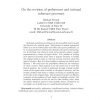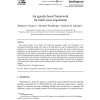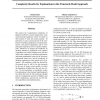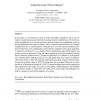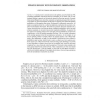100
Voted
AI
2004
Springer
15 years 16 days ago
2004
Springer
Orderings and inference relations can be successfully used to model the behavior of a rational agent. This behavior is indeed represented either by a set of ordered pairs that ref...
73
Voted
AI
2004
Springer
15 years 16 days ago
2004
Springer
86
Voted
AI
2004
Springer
15 years 16 days ago
2004
Springer
This paper presents a new model for multi-issue negotiation under time constraints in an incomplete information setting. The issues to be bargained over can be associated with a s...
87
Voted
AI
2004
Springer
15 years 16 days ago
2004
Springer
91
Voted
AI
2004
Springer
15 years 16 days ago
2004
Springer
55
Voted
AI
2004
Springer
15 years 16 days ago
2004
Springer
In this paper, we investigate the extent to which knowledge compilation can be used to improve model checking and inference from propositional weighted bases. We first focus on th...
83
Voted
AI
2004
Springer
15 years 16 days ago
2004
Springer
al Abstraction Luca Chittaro and Roberto Ranon Department of Mathematics and Computer Science, University of Udine, via delle Scienze 206, 33100 Udine, Italy ion has been advocat...
AI
2004
Springer
15 years 16 days ago
2004
Springer
Currently, there is renewed interest in the problem, raised by Shafer in 1985, of updating probabilities when observations are incomplete (or set-valued). This is a fundamental pro...
101
Voted
AI
2004
Springer
15 years 16 days ago
2004
Springer
Qualitative choice logic (QCL) is a propositional logic for representing alternative, ranked options for problem solutions. The logic adds to classical propositional logic a new c...
89
Voted
AI
2004
Springer
15 years 16 days ago
2004
Springer
Efficient Learning Equilibrium (ELE) is a natural solution concept for multi-agent encounters with incomplete information. It requires the learning algorithms themselves to be in ...
